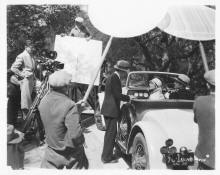The
Last of Mrs. Cheyney
|
|
Smartest of All the Talkers So Far Has the Services of Norma Shearer and Basil Rathbone Here is a rattling smart and clever play, probably not the kind you would exhibit at Sunday school picnic but its smartness is cleverness itself and yet there is nothing really downright dirty about it. ... The movie version of Mrs. Cheyney is the best acted the best spoken, the most intelligently directed and produced of any movie that first got its start as a stage play. And I say that I have said everything. When I left the Palace yesterday afternoon, a group of women leaving the theater were expressing this opinion: "Never have we seen such movie entertainment before that made us feel that we were in the legitimate theater." And as one of the group remarked. "This talker sells them to me in the future." ... The work of Miss Shearer as Mrs. Cheyney, the clever thing who works the society racket at house-breaking, reveals comedy, dramatic and facial power that she was never suspected of having. And Basil Rathbone in one leap from the legitimate stage has placed himself mighty close to the throne of John Gilbert. No kidding. Rathbone can act and how he can talk in character. —Walter D. Hickman, The Indianapolis Times, July 22, 1929 |
"Basil Rathbone, that elegant young man who appeared to such excellent advantage here recently in The Command to Love is not entirely at home in the role of Lord Dilling. Rathbone has more of the courtly, unapproachable dignity of the diplomatic attaché, than the easy familiarity of the young British roue. His sparkling repartee with Mrs. Cheyney seems a trifle pompous, lacking the swift spontaneity that made it so delightful on the stage." —Ethel Bogardus, The San Francisco Examiner, July 28, 1929
"Rathbone plays his part with ease and grace and should, henceforth, be as popular on the screen as he has been on the stage." —The Selma Times-Journal, July 31, 1929
"This is Rathbone's debut on the vocal screen. He has an attractive screen personality and a well-trained voice—naturally, for he has been a matinee idol of the stage for many seasons." —The Todmorden Advertiser, August 1, 1930
"Rathbone is splendid as the bachelor." —The Pittsburgh Press, July 30, 1929
"Basil Rathbone was a distinct hit. He extracted the most from each line of repartee, his enunciation of words being the acme of clarity. There is considerable promise for his success in the new medium." —The Los Angeles Times, July 13, 1929
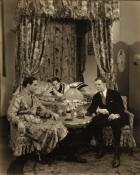 After Mrs. Webley and her guests have gone back to bed, Lord Dilling keeps watch on the thieves. |
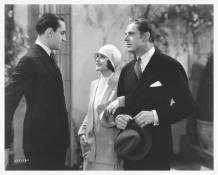 Mrs. Cheyney and Charles are prepared to go to jail for their crime. |
"The film has the distinct value of Basil Rathbone as the cynical and unmoral Lord Dilling. This expert actor becomes virtually a co-star by reason of his prominence and the delectable finish he puts on all the author's best humor of speech and situation." —Monroe Lathrop, Evening Express (Los Angeles), July 12, 1929
"Basil Rathbone plays the cheeky Lord Dilling with a suavity brought with him from the stage on which he has done so brilliantly." —Detroit Free Press, July 5, 1929
"Basil Rathbone, the fascinating stage star, leads the outstanding supporting cast." —Star Weekly (Toronto), July 27, 1929
"The work of Basil Rathbone in the part of the philandering lord who finds himself in the unusual role of endeavoring to save a woman's reputation rather than ruin it is one of the cleverest bits of acting seen on the screen or stage." —The Birmingham Age-Herald (Alabama), July 9, 1929
"Basil Rathbone was entrusted with the role of the nobleman and proves to have been a happy choice. Rathbone makes the character wittily sophisticated and withal romantic. This is Rathbone's debut on the vocal screen. He has a magnetic screen personality and a well-trained voice—naturally, for he has been a matinee idol of the stage for many seasons." —The Long Beach Sun, July 24, 1929
|
The Last of Mrs. Cheyney Norma Shearer has found an ideal leading man—a tall, suave Englishman—whose polished artistry is reminiscent of William Powell and Adolph Menjou. And, if for no other reason, than to her one of the best demonstrations of the English influence on the American talking screen, The Last of Mrs. Cheyney, should receive the peak patronage of movie devotees at the Tampa Theater this week. Basil Rathbone is a true son of Albion. He came to the United States to play in the light dramas based upon Piccadilly and Mayfair. His success on the stage was instantaneous, principally because his parts called for the mannerisms of the supposedly dull witted but really clever English. So the scenario, in which Miss Shearer plays his opposite, proves a fortunate opportunity for Rathbone to make his bid for motion picture contracts. He is the hit of a most intriguing production, wherein one finds both thrills and romance in the adventures of a pretty jewel thief, who preys upon nobility and meets disaster through the quick wits of her titled lover. The play is unusual in many respects. It is cleverly directed, the action never lags, enunciation is crystal clear and the lines breathe the biting satire, nimble repartee and the cold formalities of British drawing room. And so we have an almost perfect talkie, especially because the parts have been entrusted to a talented cast, wherein one fails to find one weak character or even a trace of overacting. —The Tampa Tribune, July 29, 1929 |
"Basil Rathbone, schooled in the theater and in sophisticated drawing room roles, adds to the rapidly-growing conviction that mellowed stage actors make excellent talking picture actors." —The Film Daily, August 26, 1929
"Basil Rathbone contributes a nice performance, but loses much of the charm he has on the stage." —The Film Mercury, July 26, 1929
"This talkie has a splendid cast headed by Norma Shearer and Basil Rathbone. ... Rathbone will be remembered for his stage appearance in San Francisco and the impression he made on local audiences. In this picture he is ideal in the role of the popular young Englishman who has a way with the ladies." —San Francisco Bulletin, July 27, 1929
"The handsome Lord Dilling is splendidly played by Basil Rathbone. Suspense, sophisticated, humor, and the splendid acting of the entire cast, make the picture an immense success." —Salt Lake Telegram, July 18, 1929
"Basil Rathbone, beloved stage actor, plays opposite Miss Shearer. As Lord Arthur Dilling he is wholly delightful. He gives a natural portrayal of this handsome and all-conquering squire of dames, and the scenes in which he plays opposite Miss Shearer are full of entertainment and delicious humor." —The Boston Globe, July 23, 1929
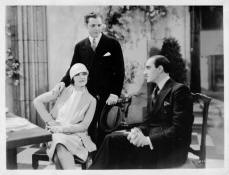 Dilling presents the group's offer: money for passage to Australia and the return of Elton's letter. |
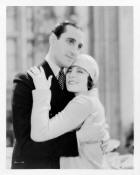 Fay accepts Lord Dilling's marriage proposal |
"Basil Rathbone as the young Englishman with whom Mrs. Cheyney falls in love is splendid in the role." —Kansas City Journal-Post (KC, Missouri), July 22, 1929
"Basil Rathbone, beloved by sophisticated stage audiences, makes a happy debut on the talking screen as Lord Dilling, the handsome philanderer." —Kenosha Evening News (Wisconsin), July 22, 1929
"Rathbone plays his part with ease and grace and should henceforth be as popular on the screen as he has been on the stage." —Norfolk Ledger-Dispatch, July 26, 1929
"Basil Rathbone, who is not always photographed as well as he or others might wish, is nevertheless an asset to this picture, for his work reveals the savoir faire of the stage. Unlike many of the film favorites, he does not have to ponder over his lines." —Mordaunt Hall, The New York Times, August 18, 1929
"Basil Rathbone, direct from the Broadway stage, lends excellent assistance as Lord Arthur." —Photoplay, October 1929
|
CANDID PHOTOS |
|
|
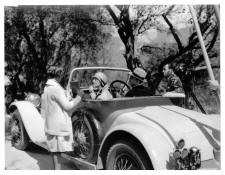 Norma Shearer freshens her makeup before starting this scene with Basil Rathbone. Director Sidney Franklin is also in the photo. |
Back to Page 1, review of The Last of Mrs. Cheyney
See Page Three for pictures of posters, lobby cards and promo photos.







